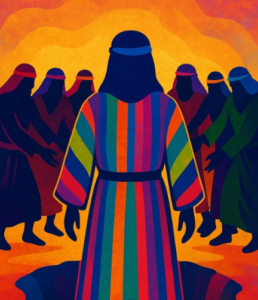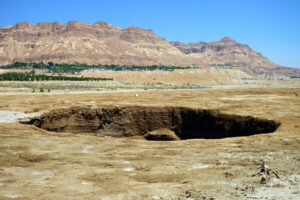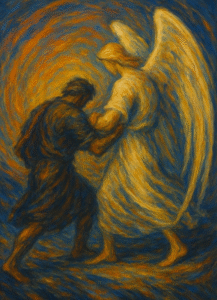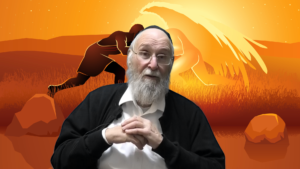- Faith ⬦ Read ⬦ Shabbat ⬦ Weekly Torah Portion
Your Money is Safe – Parshat Terumah
Have you heard of super-secure safes that cannot be broken into? It doesn’t matter how hard you try to break into them. Now, in light of the story of this week’s parsha, let us tell you about a unique spiritual safe, where we can deposit all our good desires, and no one else can have any control over them.
This week’s Torah portion is Parshat Terumah. G-d commanded Moses to speak to the Nation of Israel and ask them for a generous donation for the building of the Mishkan (Tabernacle) where the Shechinah (the Divine Presence) would dwell. A fundraising campaign was started after the Nation of Israel sinned with the Golden Calf (the Sin of the Golden Calf occurred before the commandment to build the Mishkan). The chronological order of events was as follows: On the 6th of Sivan, the Nation of Israel received the Torah – the pinnacle of faith and devekut (clinging) to G-d. Forty days later, on the 17th of Tammuz, the Nation of Israel committed the Sin of the Golden Calf, which was the worst possible form of heresy against the Creator. After this, from the 18th of Tammuz until Yom Kippur, Moses ascended to Heaven for forty days and begged G-d to forgive the Nation of Israel. He came down and after a one-day break, he went up again and begged G-d once more until on Yom Kippur, at the end of the second forty-day period, G-d happily became reconciled with Am Yisrael (Rashi on Deuteronomy 9:18), and He commanded Moses to build the Mishkan which would atone for their terrible sin. Clearly, the building of the Mishkan provided a solution also for the circumstances that caused Am Yisrael to fall into sin.
What actually happened during the Sin of the Golden Calf? One of the sublime wonders is understanding how it was possible that Am Yisrael, who were at the pinnacle of humanity, the pinnacle of faith – so much so that it was said of them: “Face to face G-d spoke with you” (Deuteronomy 5:4) – fell to such a low level in such a short period of time. We stand amazed at the absurdity of the phenomenon. Moreover, we are convinced and absolutely certain that such a thing would never have happened to us. If we had reached such a high spiritual level, we would never have fallen into such a deep spiritual pit, and certainly not in such a short time. Are we right to be so sure of ourselves?
In order to give a true and honest answer to this question, we need to learn a fundamental idea that Rabbi Nachman taught:
The Ari HaKadosh (Rabbi Yitzhak Luria) teaches that at the beginning of Creation, the light of the Creator was infinite, and there was no place for Creation to take place (because everything melted and merged with the infinity of the Creator). So, the Creator constricted the Divine light to the sides in order to create an area that was empty of the infinite light, from which all the worlds, including our physical world, were eventually created. The Creation was done with perfect wisdom as it is written: “You have made them all with wisdom” (Psalms 104:24). Everything was created in order to reveal the Malchut (Kingship) of the Creator (taken from the beginning of Eitz Chaim, see Likutei Moharan I, 64).
Rabbi Nachman teaches that this concept exists within every person: that he has a spark of Divinity from above in him. This Divine essence shines into the heart of every Jew. Just like with the Creation of the world, an infinite Divine light is to be found in the heart of every Jew. Similarly, the enthusiasm for serving G-d is also infinite, without which one would not be able to progress spiritually. Therefore, a person must “contract” this Divine light and create in his heart a chalal hapanui (vacated space) in which he will be able to serve G-d in a balanced and controlled manner as is fitting, as the verse says: “My heart is hollow within me” (Psalms 109:22). And just as the world was created with wisdom, as it is written “You did everything with wisdom,” so too should a person guard the wisdom in the heart. When a person guards himself from evil thoughts and intensifies the good thoughts in his heart, this is a manifestation of “wisdom.” When the challal hapanui is guarded in his heart, then he can reveal in the right amount and in a fitting way the Malchut (Kingship) of G-d in the world and create a dwelling place for the Shechina (Divine Presence) in his heart. If, G-d forbid, the improper thoughts multiply, the challal hapanui (the vacated space) in the heart becomes spoiled.
If we had reached such a high spiritual level, we would never have fallen into such a deep spiritual pit, and certainly not in such a short time. Are we right to be so sure of ourselves?
This clarifies in a wonderful way the words of our sages on the verse: “In your midst is the Holy One, and I will not enter the city” (Hosea 11:9). “I will not come to the Yerushalayim shel Ma’alah (Heavenly Jerusalem) until I will come to the Yerushalayim shel Matah (lower, or earthly Jerusalem)” (Taanit 5a). G-d chooses to remain with Israel, wherever they are holding during their exile. On a deeper level, this is consistent with that which we said above: that the whole purpose of the Creation, which was created with wisdom, corresponds to the Yerushalayim shel Ma’alah and was solely for the revelation of the G-d’s Malchut which corresponds to Yerushalayim shel Matah, which is why the Holy One, Blessed Be He, does not let his Shechina dwell here until the Kingdom of Jerusalem below is complete (Likutei Moharan I, 49 and also 64).
Rabbi Natan translates these ideas into practical terms which apply to the daily life of each one of us: Because the hitlahavut (enthusiasm) for the Divine in the heart of every Jew is so great, he wants at every given moment to draw closer to the Creator. However, each time he tries to draw closer to Him, the evil inclination and the Sitra Achra (the Evil Side) increase the intensity of the bad thoughts that he must guard himself against. And when he overcomes them and increases his enthusiasm for serving G-d, they, in turn, increase the desire and enthusiasm for this-worldly pleasures. Then a person oscillates between a desire for the Divine and a desire for this-worldly pleasures, in the aspect of that which was said about those who go down to sail the sea: “They went up to the heavens; they came down to the depths” (Psalms 107:26).
This is what happened after the Giving of the Torah when the Satan caused the Nation of Israel to commit the Sin of the Golden Calf. After they were at the pinnacle of enthusiasm and experienced a Divine revelation of “face to face G-d spoke with you.” Even so, at the very same time they already messed things up with the Sin of the Golden Calf, as the verse says: “While the king was still at his table [referring to the Giving of the Torah], my spikenard gave forth its fragrance.” (This is a way of describing how one’s actions can be corrupted, from the Song of Songs 1:12). To stabilize the heart which moves between the extremes like a pendulum, from a burning desire for G-d to a burning desire for the desires of this world, a person must contain his heart’s enthusiasm. This is done by keeping himself from having bad thoughts. Just as it was at Mount Sinai, Moses was required by G-d to stand guard that the Nation of Israel would not be annihilated by ascending to G-d, lest he destroy them (Exodus 19:24).
So too, whenever a person wants to guard the wisdom in his heart, he must contain the enthusiasm of his heart so that he does not completely fall from serving G-d because, as stated, it is not possible to serve G-d when his heart is aflame without limitation. In order to maintain this constriction – which refers to the challal hapanui in the heart – a person is required to keep himself from having bad thoughts. When a bad thought arises, G-d forbid, one should immediately transform it into a thought about Torah, halachah, or even business negotiations. The main thing is to save his soul from evil thoughts that destroy the heart. When one is careful not to have evil thoughts, this builds and corrects the heart, which corresponds to the entire Holy Torah, and this is considered like building the worlds that the Holy One, Blessed Be He, created in the challal hapanui. It is all for one purpose: to reveal the Kingdom of G-d in this world, the “Lower House” which is the “Lower Beit HaMikdash” (Temple) which every Jew has in his heart. When this happens, it causes an ascent to the “Upper House,” the “Upper Beit HaMikdash.”

Whenever a person wants to guard the wisdom in his heart…
Practically, the ideal place to reveal the Kingdom of G-d is in the Beit HaMikdash. The sacrifices, which ascended as a pleasing fragrance to G-d, revealed that all of creation, including animals and birds, was created in order to reveal the glory of G-d. This is why Moses was so eager to enter the Land of Israel: in order to bring the kingdom of G-d in the world to its perfection. However, because the Nation of Israel sinned, it was decreed that they should linger in the wilderness.
And in spite of everything, G-d had mercy on them and commanded Moses to build the Mishkan (Tabernacle), and He sent down His Shechina to them even in the desert. The “desert” hints at the intensifying of evil thoughts, as Rashi explains on the verse “the great and terrible wilderness” that it was full of serpents as thick as beams and scorpions as long as bows (Deuteronomy 1:19). When a person moves like a pendulum between desires for material pleasures and spiritual pleasures, and even when he is completely enveloped in base desires, G-d forbid, there is always the Mishkan, the inspiration of the Shechina which dwells with us and helps us to guard ourselves from evil thoughts and reveal the Malchut of G-d in this world.
But this does not only apply to the time of the Mishkan but even in every generation. Our sages taught us on the verse: “I have been for them a minor sanctuary” (Ezekiel 11:16) that these are the synagogues and study halls of Bavel. Because, in fact, the idea is the same: after G-d revealed that His Shechina was dwelling in the Mishkan in the desert, far away from the ideal and most fitting place for it, this means that every person can draw down to himself the sanctity of the Mishkan anywhere and at any time. This is the most protected safe where everyone can deposit their good desires, their personal contribution, their precious stones, mitzvos and good deeds – everyone according to his ability. Everything is gathered in the Mishkan, and everything shines with its precious light. There is no power in the world that can invalidate these good desires, in the aspect of that which is said: “who is it who pledged his heart to approach Me?” (Jeremiah 30:21). That is, in the synagogues and study halls where all the good desires in the world are gathered and guarded very carefully, the Sitra Achra cannot stand before G-d Himself and fight Him, and instead it is subdued against its will.
Rabbi Natan teaches that the very reading of these parshiot dealing with the inspiration of the Shechina in the desert has the power to literally draw into our hearts the Shechina of HaKadosh Baruch, just as it was in the Beit HaMikdash, provided we prepare our hearts well and keep ourselves from evil thoughts. Then we will merit that the Shechina will dwell completely with us.
(Based on Likutei Halachot, Tefillat Mincha 7, 10-12)
- Beit HaMikdashbreslevBreslovDvar Torah for Parshat TerumahExodus of Egyptfaithfeaturedgood deedsgood desiresJerusalemJewishJewish spiritualityjudaismLikutey HalachotLikutey MoharanMatan TorahMishkanMt. SinaiNegative ThinkingParshat Terumahpositive thinkingpower of willReb NosonRebbe Nachmansafesin of the Golden Calfspiritual achievementsTabernacleterumahThe Holy TempleTzaddik
- 0 comment






















